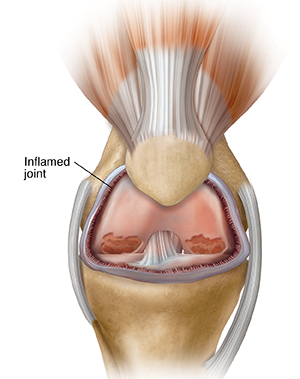A
B
C
D
E
F
G
H
I
J
K
L
M
N
O
P
Q
R
S
T
U
V
W
X
Y
Z
Click a letter to see a list of conditions beginning with that letter.
Click 'Topic Index' to return to the index for the current topic.
Click 'Library Index' to return to the listing of all topics.
Understanding Psoriatic Arthritis
Psoriatic arthritis is joint pain and swelling that occurs in some people who have psoriasis. Psoriasis is a skin disease that causes scaly skin patches. People who have it may get psoriatic arthritis later. In some cases, the arthritis occurs before psoriasis.

How to say it
sor-ee-A-tik arthritis
What causes psoriatic arthritis?
Doctors don't know the exact cause of psoriatic arthritis. But it's linked to problems with the body’s infection-fighting system (immune system). Other factors include:
-
Family history. People who have psoriatic arthritis often have relatives with either psoriasis or arthritis, or both.
-
Certain infections. These include strep infections and HIV.
-
Environment. Stress, injury to skin, and certain medicines may trigger psoriasis to become active.
What are the symptoms of psoriatic arthritis?
Symptoms may include:
-
Pain, tenderness, and swelling in any joint, including the spine.
-
Joint or back stiffness, especially in the morning.
-
Patches of rough skin. They are usually red underneath and scaly and white or silver on top.
-
Fingernail problems. These may include pitted or crumbly nails, or nails that are detached from the nail bed.
-
Pain and swelling where muscles attach to bones.
-
Swelling of the fingers or toes.
-
Eye redness or inflammation.
How is psoriatic arthritis treated?
Psoriatic arthritis doesn't go away. It's a long-term (chronic) condition that needs long-term treatment. Medicines are an important part of treatment. These medicines may include:
-
Prescription or over-the-counter pain medicines. These help reduce swelling and pain.
-
Prescription medicines that limit the effect of the immune system. They may reduce or prevent joint damage. Methotrexate is a pill that's often used. Biologic and targeted synthetic medicines and skin patches may also be used.
-
Steroid injections in affected joints. These can help ease symptoms.
-
Topical medicines for rough skin patches. You put these on the skin to ease discomfort and dryness.
Your doctor may also recommend:
-
Regular exercise to improve flexibility and strength.
-
Physical therapy. It can help ease pain and improve flexibility.
-
Heat packs. They can help ease pain and swelling.
-
Shoe inserts to keep your feet and ankles stable. They can also help with foot pain.
What are the complications of psoriatic arthritis?
Possible complications include:
When should I call my doctor?
Contact your doctor right away if:
-
You have a fever of 100.4°F (38°C) or higher, or as directed by your doctor.
-
You have pain that gets worse.
-
You have symptoms that don’t get better or that get worse.
-
You have new symptoms.
Online Medical Reviewer:
Melinda Murray Ratini DO
Online Medical Reviewer:
Rajadurai Samnishanth Researcher
Online Medical Reviewer:
Raymond Kent Turley BSN MSN RN
Date Last Reviewed:
6/1/2025
© 2000-2025 The StayWell Company, LLC. All rights reserved. This information is not intended as a substitute for professional medical care. Always follow your healthcare professional's instructions.